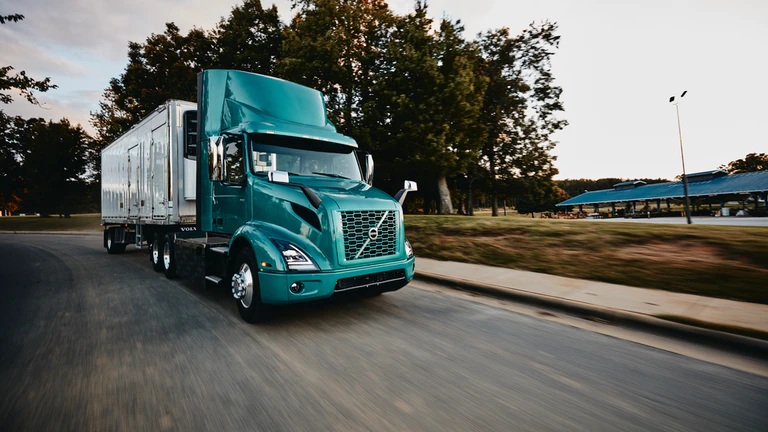For 25 years, Volvo Financial Services (VFS) has been the financial solutions provider for Volvo Trucks customers. Today, in addition to more traditional offerings, VFS has developed finance and insurance solutions for Volvo VNR Electric customers. The Volvo VNR Electric truck model is designed for fleet applications and drive cycles with local and regional distribution ranges in addition to food and beverage and pickup and delivery routes. VFS will provide dealer financing options, including floor plans for stock or pre-sold units, along with financing solutions for on-site charging stations. Chris Roback, vice president of sales and customer experience at VFS, shared his insights on how commercial fleets can best evaluate their specific vehicle finance needs, as well as how they can get ready for the widespread adoption of electric trucks.
FleetOwner: Talk of electric trucks is becoming more and more prevalent in the industry. How can fleets best prepare financially for widespread adoption of these vehicles?
Chris Roback: The first thing to know about electric trucks is that even if these vehicles have a higher initial cost, once you factor in available incentives and total cost of ownership, they can be cost-competitive with comparable diesel vehicles.
Customers’ main challenge will be how to implement a gradual transition to electric vehicles that allows them to test the new technology in real-life applications while minimizing operational, maintenance, and financial risk. This approach goes beyond the truck and involves route suitability, charging solutions, power availability, uptime, incentives, and financing.
As this is a completely new area for most trucking fleets, it is key to have a partner that can provide end-to-end solutions, working consultatively with customers to design and implement an electromobility transition plan and guide them through the process.
Volvo Financial Services has developed a suite of financial solutions that reduce customers’ upfront capital needs and allow them to access electric trucks without worrying about future vehicle performance, maintenance, or end of life. One solution is our combination of a VFS electric truck lease with Volvo Trucks North America’s (VTNA) Gold Contract, offering customers the peace of mind that their trucks will be kept at peak performance for their entire life cycle. In some cases, VFS has even been able to apply grants, subsidies and incentives to the lease structure, further reducing monthly payments.
FO: What about charging infrastructure? How can fleets ensure that their electric vehicles stay fully charged and ready to go?
CR: Charging infrastructure is a key part of our total offer. At VFS, we are committed to providing financial solutions to enable the deployment of turnkey charging solutions at customers’ sites as part of a total solution deal. Our solutions will provide flexibility to customers, ranging from traditional loan financing of charging stations to more complex usage-based alternatives where customers can pay as they charge their trucks.
Furthermore, Volvo Group has just announced the creation of a new business area, Volvo Energy, that will expand our energy offering.
FO: Overall, what should fleets be thinking about when evaluating their need for financial assistance?
CR: A few areas that a fleet owner should consider would be the possible growth or replacement needs of their truck fleet, including the optimal replacement life cycle based on their business operations. Replacing trucks far beyond the optimal replacement period could result in significantly higher maintenance costs. Consistency in managing fleet life cycles can improve operating costs and help avoid unexpected repair costs on older trucks.
FO: How did COVID-19 impact financial service offerings?
CR: As an essential industry, trucking did not stop, and for Volvo Financial Services, we worked closely with our customers, continuing to meet their financing needs, whether it involved replacing assets or helping them increase the size of their fleets. As the impact of the pandemic began to affect the industry, we provided payment relief to our customers. We also implemented several finance programs together with Volvo Trucks offering incentives such as credit toward initial monthly installment(s), and down payment assistance.
We learned many lessons in 2020 and identified several opportunities that we are taking with us into 2021. In addition, we streamlined our internal processes to help our customers who may still need payment relief with an online tool, as well as the use of electronic signatures and e-docs to get payment relief processed quickly.
FO: What trends are you anticipating for 2021?
CR: During this year, we expect many fleet customers to continue replacing aged inventory. One area of increasing popularity among fleet owners is a “bundled services approach” to business. Customers can combine on one invoice their financing and maintenance/service products from VTNA.
Source: https://www.fleetowner.com/
CUT COTS OF THE FLEET WITH OUR AUDIT PROGRAM
The audit is a key tool to know the overall status and provide the analysis, the assessment, the advice, the suggestions and the actions to take in order to cut costs and increase the efficiency and efficacy of the fleet. We propose the following fleet management audit.




